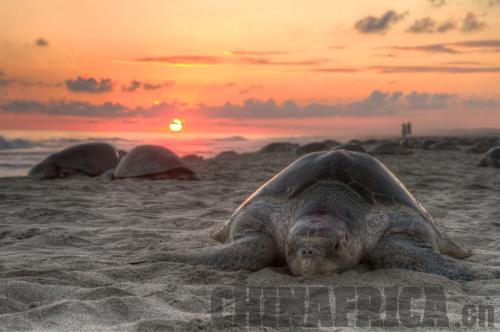|
 |
|
Photo by Claudio Giovenzana |
Over the last several years, dozens of sea turtles have been washing up on the shores of Central Africa dead. Many of these creatures, olive ridley turtles, were adult females poised to breed. Most puzzling, though, is that these turtles are being found on protected beaches that belong to national parks both in Gabon and the Republic of the Congo.
Olive ridleys are considered to be the most abundant sea turtles on the planet, with around 800,000 females nesting annually. They can be found around the globe, in places like China's Hainan and Hong Kong, among others. In spite of their numbers, they are the world's most exploited species of sea turtle, according to organizations like the International Union for Conversation of Nature and Natural Resources (IUCN), the oldest global environmental network of its kind. IUCN lists olive ridleys as endangered.
The threats facing olive ridleys, named for the color of their heart-shaped shells, are myriad. Both they and their eggs sell at a high price for poachers. Fisheries are also problematic for the turtles; they can become entangled in all sorts of fishing nets underwater that prevent them from surfacing for air.
These factors technically should not have been an issue, though, in the case of the dead turtles dotting the shores of Gabon's Mayumba National Park and the Conkouati-Douli National Park in the Republic of the Congo. The parks are adjacent to each other, and border the Atlantic Ocean. Mayumba, Gabon's only national park, stretches for 900 square km – 15 km out to sea – in order to provide adequate protection to the olive ridleys. The UNESCO-recognized Conkouati-Douli has similar boundaries, although trawlers have been seen in its waters, according to BBC reports. Unlike national parks in East Africa, parks on the opposite side of the continent are relatively young and unknown (Conkouati-Douli has only been around since 1999), which hampers conservationists' attempts to protect their species from outside human interference.
In an attempt to tackle the olive-ridley problem, an international group of scientists tagged 18 female turtles with satellite transmitters in Mayumba. They wanted to track the turtles' movements to better understand the kinds of protective measures needed to prevent more deaths. In general, not much is known about the olive ridley's habits. There are no concrete statistics about average lifespan, and not much information about nesting habits, just that the turtles gather in the thousands offshore and then head together toward land to lay their eggs. No other sea turtles nest en masse like the olive ridleys do.
In May, the scientists published their findings in the journal PLoS ONE. They found that the olive ridleys like to travel – and far outside the reaches of Mayumba's waters. The study's biggest discovery was that the turtles spend more than 50 percent of their time outside of Gabon entirely, in the Republic of the Congo territory. The further away they moved from the Gabon park, the more often they came into contact with deadly fishing nets.
In response to the findings, the Wildlife Conservation Society, an American organization with projects worldwide, has pushed for an expansion of both Mayumba and Conkouati-Douli. And now, national parks agencies in Gabon and the Republic of the Congo are working together to create the first international marine park in Central Africa, signaling that in the future, less olive ridleys may be lost at sea.
Tech Bytes
➲ From July 12 to 14, the Institute for International Research is holding its Third Annual IT Governance Summit in Johannesburg, South Africa. The conference will feature experts across the IT spectrum, including speakers from South Africa's Department of Defence. Topics explored will include cloud computing, privacy laws, and IT risk management. For more information, visit http://www.iir.co.za/.
➲ Miscanthus, also known as Chinese silver grass, is gaining prominence in bioenergy circles for its potential as an energy crop. This kind of crop is harvested and burned to generate power, like heat and electricity. The best of these are ones that can be grown in poor-quality soil so as not to compete with food crops, and miscanthus is highly stress-resistant. As such, researchers with the Chinese Academy of Sciences are optimistic about their current plans to domesticate the wild grass species. |